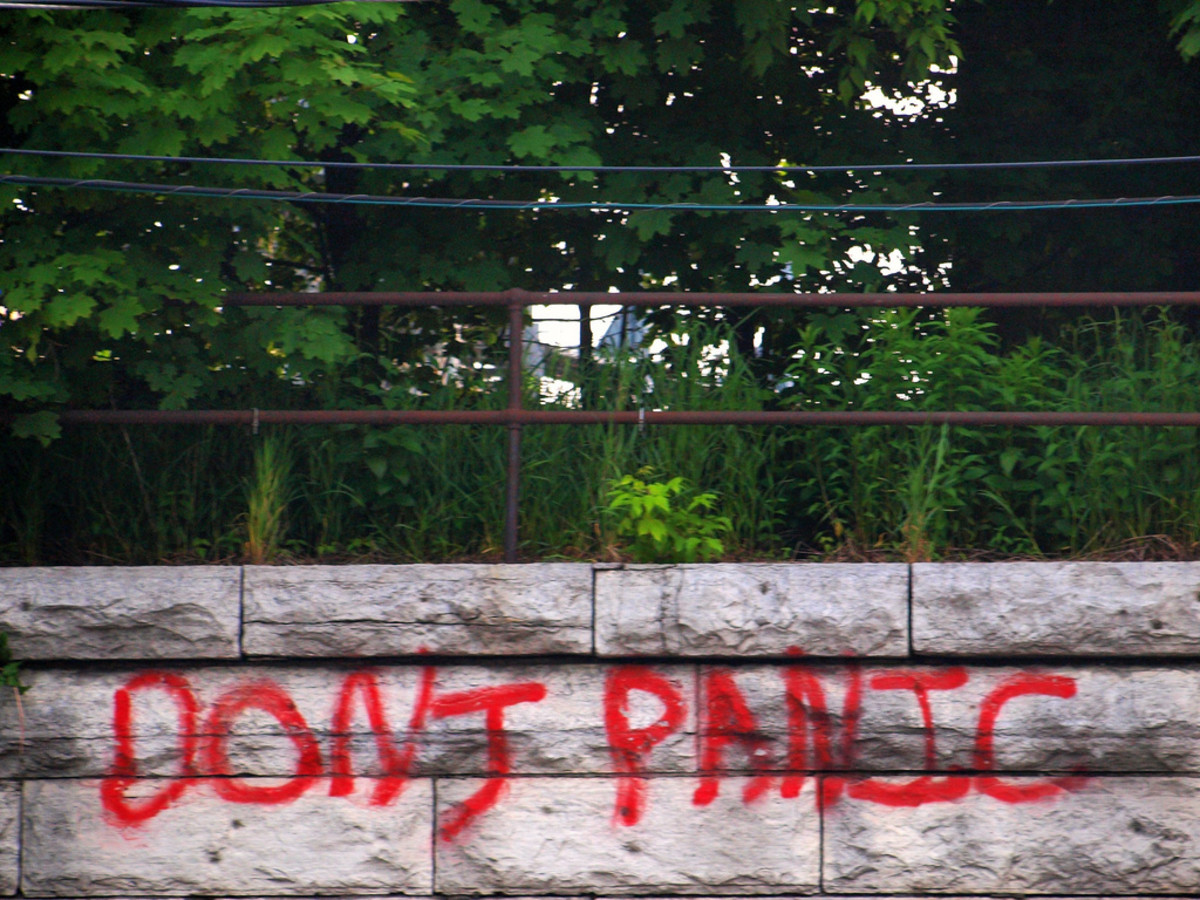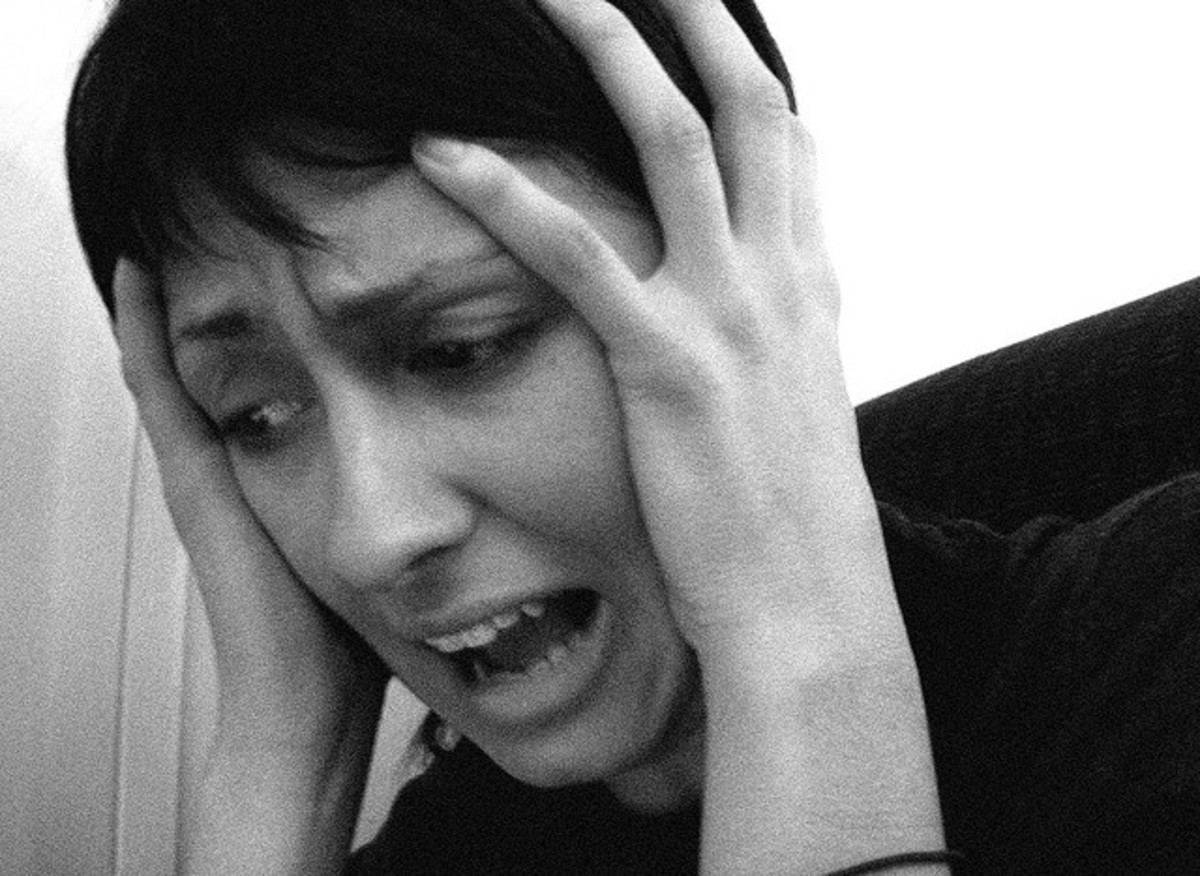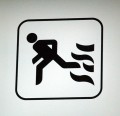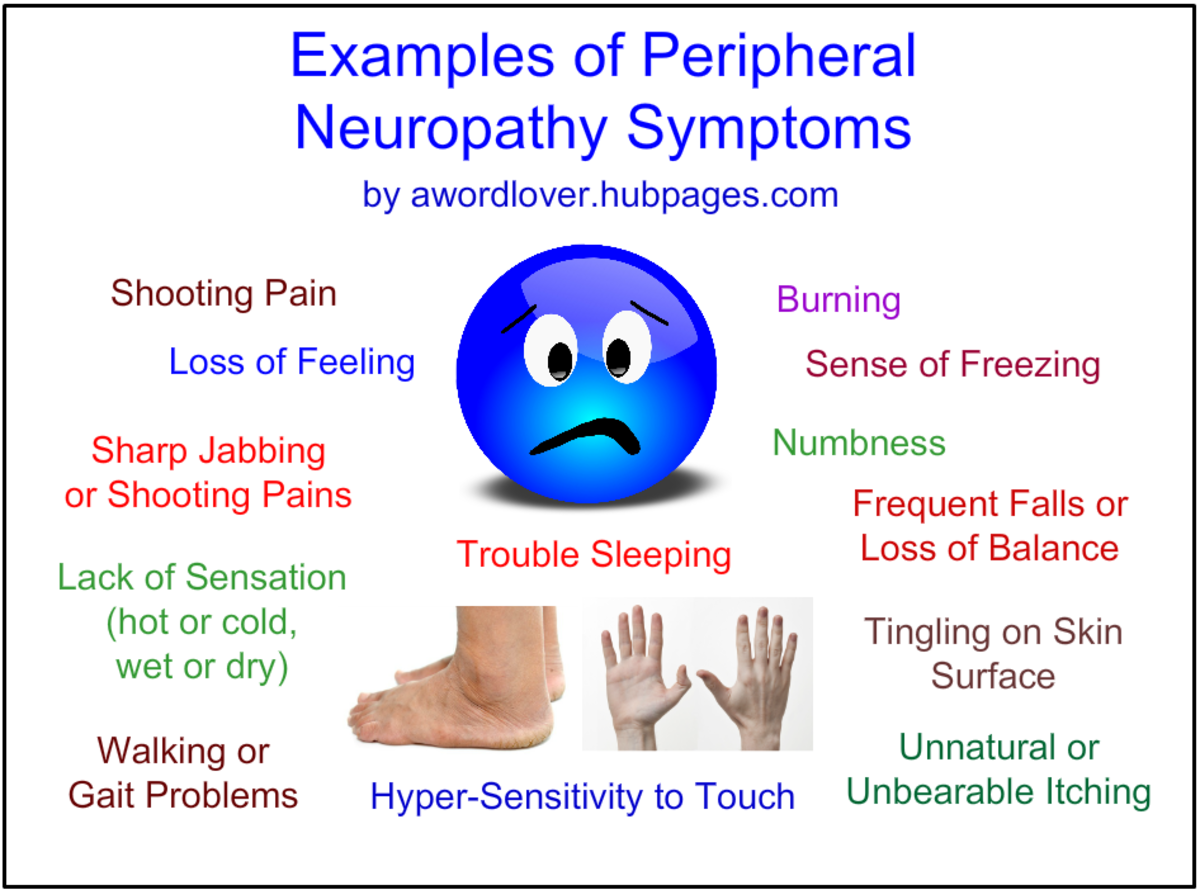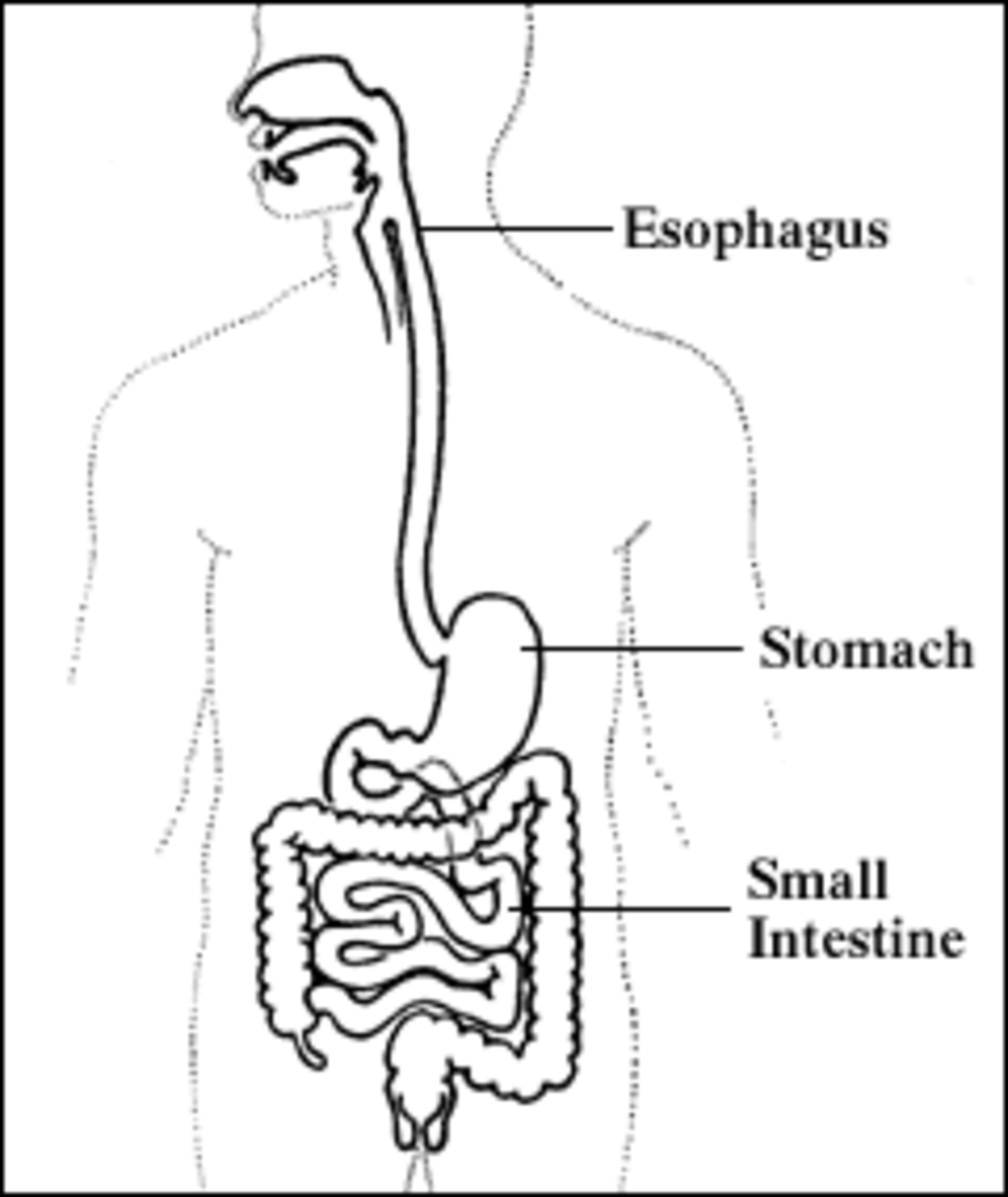Panic not : an answer to anxiety!
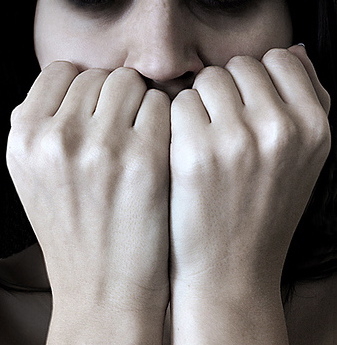
Panic attacks
When ancient humans faced a threat of nature, their lives were saved by adrenaline. This hormone is released as a response to danger and does several things in an instant: It makes our heart pump harder, delivering more blood to our muscles. The breathing gets faster, helping us get more oxygen into our systems. Our senses get sharper and more aware, allowing for quick reflexes. Our mouth and bowels receive less blood, making the mouth dry and the stomach and intestines feel queasy. It reduces judgement and thought, allowing for more primitive reflexes to take over. This is why adrenaline is called the ‘fight, flight and fright hormone’.

Evolutionary Residue
As we’ve evolved the dangers we face are no longer the same, although our capacity to produce adrenaline remains. In most of us, the stresses and shocks of modern living can cause an adrenaline burst.
When this happens, we get palpitations as the heart beats harder, we hyperventilate as our breathing gets faster, we get pins and needles, our mouth goes dry, we feel sick and dizzy, we sweat more and our stomach goes queasy. This is what is known as a Panic Attack.
Anyone can have one, and if it is a direct response to a shocking event, we understand it and deal with it. Adrenaline also triggers ‘endorphins’ which are the body’s natural pain killers and pleasure hormones. This may explain why some of us like a scary movie, a thrilling ride or extreme sports leading to the term, ‘adrenaline junkie’.
The Key Symptoms of an Anxiety Attack
Symptoms of Panic Attack - Can be any of the following
|
|---|
Pounding heart beat ( Palpitations)
|
Breathing fast (Hyperventilation)
|
Shaking visibly ( Tremors)
|
Choking Sensation ( Globus Hystericus)
|
Dizziness
|
Feeling light headed
|
Tingling in face, arms and leds ( Paraesthesia)
|
Chills or hot flushes
|
Sweating/ feeling clammy
|
Blushing/ flushed feeling
|
Stomach cramps/ Nausea
|
Wanting to go to the toilet urgently
|
Neck Pain/shoulder pain
|
Chest pain/ discomfort
|
Feeling 'out' of it / Depersonalisation
|
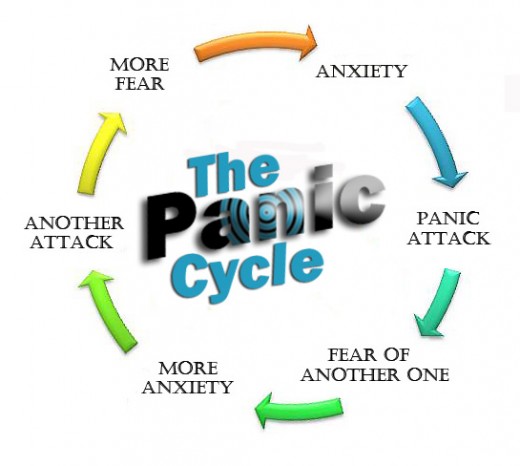
Cycle of Fear
As you can see from the table above panic attacks can mimic symptoms of other conditions- palpitations will make us think there is something wrong with our heart, breathlessness and choking can make us think we have a breathing disorder like asthma, stomach problems will make us concerned about tumours and ulcers.. and so on.
As there is so much health information in the internet and in public domain, people tend to look up the symptoms and pick the worst possible scenario. this creates what is called the cycle of fear.
The more we worry- the more panic symptoms we get and this can lead to more worry. The issue is also negative test results- a physician can do tests to check your heart and your lungs and may proclaim all tests are normal ( as they will be) instead of giving reassurance this makes us panic more.
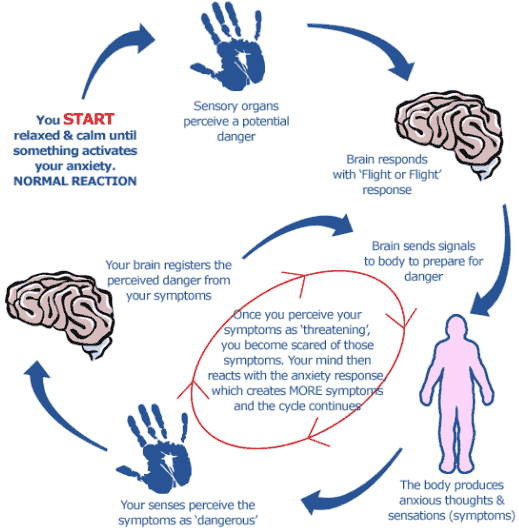
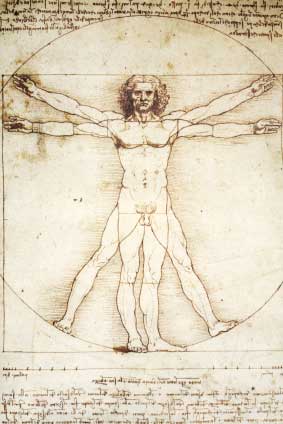
Related Hubs on Health and Medicine
- Every Body Part Tells a Story #1: A History of Anatomical Terms
The human body has fascinated and educated humanity over centuries. From the earliest morbid fascination leading to the secret study of cadavers and... - Changing for Good : New Year, New You!
New Year, New You! Its the season of good cheer, good will and merriment. The last thing we want to think about is changing. Yet, New Year is just around the corner, ready to receive our plans,... - Tell me What it is
The process of diagnosis is at the heart of practising medicine. The patient consults the clinician with symptoms that are abnormal or perceived as abnormal. The clinician takes a careful history, evaluates... - Coping with Chronic Pain
We have all had pain, admittedly some more than others. (I put that in for the women readers muttering, you men have no idea). Sometimes it is mild, sometimes it is unbearable. Some are short lived and... - Menopause: Feeling hot, hot, hot!
In most western countries, women are now living long enough to spend half their adult life after the menopause. In this era of information overload, it is surprising how little reliable information women...
Types of Panic Disorders
About one in 20 people can suffer from panic disorders but each one can be different. There are several types of panic disorders. Below is a list of some types:
a) Acute Stress Reaction
Lasts for a few minutes to an hour usually as a response to a stressful event. The shock of a stressful news will trigger a cascade of symptoms.It can be receiving bad news, a family problem, work related stress and anything that is sudden and frightening.
Sometimes the symptoms can last longer for a few days but usually go once you adjust to the news and feel reassured. The initial shock wears away and you start to feel better.
b) Adjustment Reaction
This takes weeks or months. This could be a major event like bereavement, divorce or loss of property etc. However once again the symptoms can go once you know what they were related to and receive support/counselling or reassurance from friends and family
c) Post Traumatic Stress disorder
an accident, a major trauma, witnessing horrific events can all lead to PTSD. The symptoms can last for months or even years and are characterised by: recurring images, flashes of morbid thoughts, vivid memory of events, detachment from reality, depression, apathy and irritability. A sense of alienation where you feel no one will understand leading to deeper problems.
d) Phobia
This could be any phobia: sociophobia, fear of heights ( Acrophobia), closed spaces (Claustrophobia), open spaces ( Agoraphobia), spiders ( Arachnophobia), fear of injections, fear of choking etc.
e) Generalised Anxiety disorder
This is characterised by a lot of anxiety spells, insomnia, muscle tension, fatigue, irritability and depression lasting for long periods.
f) Obsessive-Compulsive Disorder
Here you obsess over items, events or rituals like washing hands, locking doors, checking for car keys, checking a new baby and so on. compulsive actions and obsessive thoughts go hand in hand.
Can Panic Attacks Kill me?
Not at all. Panic attacks cannot do physical harm as the adrenaline responsible for the attack dissipates after a few cycle. Panic does not cause heart attacks or breathing problems over long term or acutely. However the attacks are unpleasant, can really take over our life and cause severe psychological distress as well as physical exhaustion.
About 2% of the population suffer from frequent panic attacks known as ‘Generalised Panic Disorder’. This can be very stressful and debilitating and can have an impact on their life and their family. Women suffer twice as much as men, and these can be worse during the menopause.

How do we control and treat Anxiety?
There are many different treatments available depending on the type and severity of a problem. A consult with a physician or a therapist is usually worthwhile if the symptoms are recurrent and seriously debilitating.
Also one cannot assume it is anxiety in some cases there may be an underlying physical cause if the usual self-help doesn't work.
As with most treatments it all starts with:
a) Understanding:
A thorough understanding of the triggers, the symptoms and what is happening to the body helps to reassure the panicking mind. Talking to friends or members of the family will help to further this understanding and can have a supportive influence.
b) Counselling/ Anxiety Management Courses
These help to identify coping strategies and make a plan of action to deal with the problem
c) Self help guides:
There are a lot of detailed self help guides which will help you with your strategy.
d) Cognitive Behavioural Therapy
Very useful for longer problems like adjustments reactions, phobia and PTST, Obsessive-Compulsive disorders. Once again helps develop coping strategies and needs to be delivered by a trained physician or a therapist. There are some newer tools for delivering CBT through online tools. Worth enquiring.
e) Medications:
These are usually useful for short and long term treatments and act as valuable support when used in conjunction with self-help and therapy. One major rule with medications is it needs to be prescribed by someone who knows what they are doing, should be done collaboratively and individually and there always needs to be a plan for how much, how long and with what other treatment.
There is a danger if one relies on medication alone without a proper plan, then it can become addictive and debilitating and become a problem itself. if this happens you will get more anxiety when trying to come off the medications.
Some of the medications used and their indications are listed in the table below.
Some Medications used
Drug Class
| Indications
|
|---|---|
Anti-Depressants ( SSRI,SNRI)
| These take time to work and are used for more longer lasting problems associated with elements of depression. They are NOT addictive themselves but if there is no clear plan there can be psychological dependance
|
Benzodiazepines ( Diazepam etc)
| Very useful for short term relief of panic symptoms and relaxing physical manifestations. Can be highly addictive if used without any plan and if used longer than necessary.
|
Betablockers
| Useful for palpitations and hyperventilation sweating etc. usually drugs like propranolol are best suited and can also help to reduce anxiety associated rise in Blood pressure.
|
Don't Worry, Be Happy!
Fortunately this condition can be treated and managed. Having a good understanding of what is happening to the body helps greatly. Sufferers often worry that others think ‘it is all in their mind’.
The mind may be the trigger, but the symptoms are all physical.
Hope this hub was useful and do leave your comments below.
Be well and take care.
Copyright © Mohan Kumar 2011


